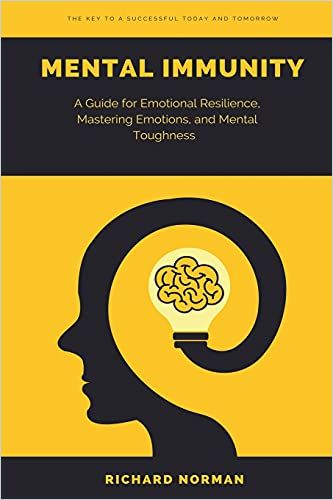Richard Norman provides helpful, if familiar, ways to stay strong amid stress and boost your self-regard.

Tools for Mental Peace
Author Richard Norman offers techniques for regaining control over your thoughts and your life and provides practical strategies for building emotional resilience and mental clarity.
Mental Immunity
Mental immunity is the ability to cope with life’s challenges and painful thoughts without either ignoring or denying them – or having them derail you. Negative emotions such as fear, loneliness, and uncertainty can weaken your mental resilience and make setbacks feel overwhelming. Building emotional resilience involves accepting and understanding these feelings. Norman advises focusing on processing your emotions mindfully, grieving your losses, and learning from your struggles.
Being emotionally stable is the aim since this allows us to cope better when things get tough.Richard Norman
Resilience enables you to cope with difficult situations, manage stress, overcome adversity, and rebound from setbacks. Like a child getting back on a bike after falling, resilient people recover quickly from setbacks by turning their attention to positive future possibilities.
Draw on your knowledge of who you are to stay psychologically and spiritually grounded and to navigate crises. Work to cultivate the mental, emotional, and physical toughness to withstand stress. To manage change effectively, try to adapt to new circumstances rather than resisting them. Think of this as bending with the wind to avoid breaking.
For mental balance, appreciate all life events, good and bad. See challenges as opportunities to grow personally, mature, and become more capable. A grateful heart can refresh your perspective and inspire hope.
Psychological Well-Being
Offering familiar but solid advice, Norman also counsels getting sufficient sleep, maintaining a healthy diet, and exercising. He cautions that stress and a poor attitude undermine your outlook on life. Unaddressed stress has a deleterious impact on your decision-making abilities and long-term brain health.
Turn to regular aerobic activities such as running or swimming to build new brain connections, improve sleep, and boost self-confidence. Doing yoga or taking a walk in nature can help you relax, manage stress, lower your blood pressure, relax muscle tension, and build a strong foundation for emotional well-being.
Focus on your psychological wellness to build your resilience in the face of stress. This will boost your mental clarity and even help prevent cognitive decline.Richard Norman
Also maintain your personal connections with your friends, family, and pets to combat stress and enhance your well-being. Laughter reduces stress hormones and boosts your mood, so find opportunities to share fun moments with your family and friends.Adopt a positive mindset and a grateful attitude to improve your stress management and build resilience.
In times of stress, share your worries with a person you trust, a friend or a relative. Play sports, watch movies, or spend time with friends or pets to unwind and relax. Set aside time for high-quality sleep. Sufficient sleep regenerates brain cells and relieves mental fatigue.
Mentally tough people can teach you to be strong.
Resilient people have a positive attitude, cope well with stress, find satisfaction in their work, and perform well in difficult situations. Norman notes that studying the character traits of mentally resilient people can give you insight into how to strengthen your own resilience and ability to handle life’s challenges.
Resilient individuals cultivate a strong social support system, maintain optimism, believe in themselves, and adapt readily to new circumstances. They are curious and set priorities so they can focus on important actions, thereby aligning their use of time and energy with their values. Resilient people regard challenges as opportunities, not threats. The meaning and purpose they find in work and play help them stay grounded and focused during crises.
To develop mental toughness, Norman writes, learn how to use “emotional regulation” to manage your emotions effectively so you can stay calm under pressure. Delay gratification to avoid reacting impulsively in stressful situations. Identify the true causes of your problems and seek practical solutions. Believe in your abilities, such as being able to take on new challenges with confidence. Practice “realistic optimism” to stay positive and grounded about the future. Maintain hope as you confront challenges. A mentally tough attitude gives you the strength to keep going despite life’s pitfalls.
Courage
Facing your fears requires confronting uncertainty and potential failure. To build your tolerance and confidence, gradually expose yourself to what you fear in small, manageable steps. To face your fears and handle conflict, strengthen your self-awareness and self-control. Self-awareness helps you understand how your emotions affect your actions. Self-control enables you to manage your reactions and stay composed under stress.
Never wait for a problem to go away. Denying or avoiding conflict or dodging something that scares you or makes you uncomfortable only reinforces the issue’s pitfalls. To equip yourself to handle life’s ups and downs and to ease your recovery from setbacks, maintain a positive outlook. Surround yourself with positive people. And, remember that being of service to others can grant you a sense of perspective, fulfillment, and happiness.
We create the future through our response to the challenges of today.Richard Norman
Understand what triggers your stress or anxiety and address those triggers proactively. Interpret setbacks as temporary and specific rather than permanent and pervasive. Take the initiative in difficult situations. Seek solutions rather than dwelling on problems. Prioritizing your health and well-being will help you effectively balance your emotional responses with logical thinking.
Familiar Tools
Richard Norman offers familiar tools to help you thrive amid challenges and embrace the journey toward mental strength and well-being. He offers techniques to master your feelings, enhance your mental toughness, and face adversity with renewed confidence. While Norman’s tactics are sound, his ideas include cliches you’ve likely read previously. Turn to this comprehensive resource if you’re new to the field, seeking a compact package of good advice, or in search of a review of methods you’ve heard about but aren’t mustering under pressure. Norman sets out to help you transform your mindset, unlock your full potential, and reconnect with all the power you already possess.













